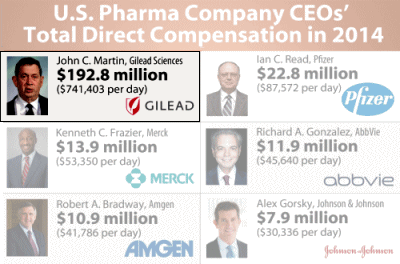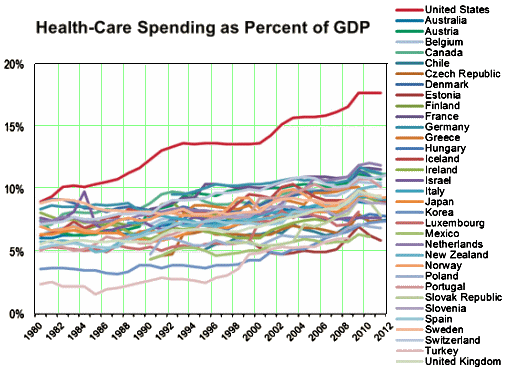Center for Economic and Policy ResearchBeat the Press blogby Dean BakerJuly 23, 2015This NYT article [below] on various state bills calling for drug companies to reveal their spending on research for high-priced drugs might have been a good place to mention that we have alternatives to patent financing for prescription drug research. For example, the federal government already spends more than $30 billion a year on research through the National Institutes of Health. If this sum were doubled or tripled, it could likely replace the patent supported research now being done by the drug industry.
And, since the research was all paid for upfront, the great new drugs developed for cancer, AIDS, and other diseases could all be sold as generics. Then we would not face tough decisions about whether to pay for expensive drugs for people who need them. We also would have eliminated the incentive for drug companies to mislead the public about the safety and effectiveness of their drugs.

[remember this?
New York TimesBy ANDREW POLLACKJULY 23, 2015As complaints grow about exorbitant drug prices, pharmaceutical companies are coming under pressure to disclose the development costs and profits of those medicines and the rationale for charging what they do. So-called pharmaceutical cost transparency bills have been introduced in at least six state legislatures in the last year, aiming to make drug companies justify their prices, which are often attributed to high research and development costs.
“If a prescription drug demands an outrageous price tag, the public, insurers and federal, state and local governments should have access to the information that supposedly justifies the cost,” says the preamble of a bill introduced in the New York State Senate in May. In an article being published Thursday, more than 100 prominent oncologists called for support of a grass-roots movement to stem the rapid increases of prices of cancer drugs, including by letting Medicare negotiate prices with pharmaceutical companies and letting patients import less expensive medicines from Canada.
“There is no relief in sight because drug companies keep challenging the market with even higher prices,” the doctors wrote in the journal Mayo Clinic Proceedings. “This raises the question of whether current pricing of cancer drugs is based on reasonable expectation of return on investment or whether it is based on what prices the market can bear.”
Pressure is mounting from elsewhere as well. The top Republican and Democrat on the United States Senate Finance Committee last year demanded detailed cost data from Gilead Sciences, whose hep atitis C drugs, which cost $1,000 a pill or more, have strained the budgets of state and federal health programs. The U.A.W. Retiree Medical Benefits Trust tried to make Gilead, Vertex Pharmaceuticals, Celgene and other companies report to their shareholders more about how they set prices and the risks to their businesses from resistance to high drug prices…
We’re going to have to do something about this – and soon. The only question is do we tweak the system like we’ve done over and over? or do we change it altogether like the blog above suggests? If we tweak it, we can set our clocks for how long it will take industry to find a loophole or two. To quote the famous, "How long? Not long!" The other thing to take into account is that the pharmaceutical and medical device industry has one of the most powerful lobbies in Washington, so any changes will take forever and will likely end up with loopholes already built in.
I’m neither a communist nor even much of a socialist. Our silly greedy capitalism happens to be the best of the bad options available. But in the area of medical care, I’ve become a social democrat. And the Social Democracies of the world have already figured out that some form of socialized medicine is the only solution to many other of the problems that plague medicine these days.

To be fair, in a true free market economy, the customer who is the patient would be making the purchasing decision not a third party and not the government…what we have now is really a fascist system in which the government picks winners and losers based supposedly on national interest but in practice on lobbying influence. Fascism doesn’t necessarily mean boxcars, it’s business and government getting together and controlling distribution.
http://www.zerohedge.com/news/2015-04-14/one-chart-proves-obamacare-really-working-fascists
But I agree the situation is not sustainable…for one thing if Gilead sets a precedent here, other companies will do it and CMS will be insolvent in a hurry…it’s already bankrupt in effect at least long term…
Adam Smith said the free market naturally tends towards monopolies.
The American ideal of the “free market” is an unattainable utopian concept. When a player gets wealthy enough, it starts rigging the game. It was ever thus, and ever will be, like the principle of gravity.
I think the main meaning of the graphic is what an utter scam managed care and all of its iterations (eg. Pharmaceutical Benefit Managers) are. Anyone who has followed business trends in America knows that any business that hopes to be successful has to pay tribute in Washington. In some cases, entire businesses like credit reporting, have been invented strictly on the basis of these government connections, The parallel development is that we now have business “experts” who don’t know anything about the businesses they run and run them strictly on the basis of making money.
The confluence in medicine has been the addition of hundreds of billions of dollars in “managers” – none of who know anything about science or medicine who claim to manage it. They have gotten free rein to pull this off as proxies for governments who contend that their health care costs were too high. So we had added hundreds of billions of dollars per year in management costs for rationed, low quality care and this process has been going on for 30 years or the entire range of the graph.
Monopolies and rationed low quality care don’t happen on their own. They happen courtesy of the US government.
I will also add that high cost drugs aren’t the only problem. There is currently a huge market for “abuse deterrent opioids” that are all combinations of inexpensive generic opioids and opioid antagonists. Wall Street sees these as potential blockbusters or billion dollar a year drugs. The FDA’s opioid advisory committee voted to block release of one of these drugs based on the fact that we are currently in the midst of an opioid epidemic that results in about 12-15,000 overdose deaths per year. That committee was overruled by the regulators and the drug was released.
So drug don’t have to be expensive or for that matter scientifically sound to be approved and marketed. All courtesy of the US government. Churchill’s quote about Americans is as appropro here as anywhere.
Now now. Our humble elected public kleptocratic servants must have access to life’s necessities…
http://observer.com/2015/07/with-a-new-luxe-mall-d-c-s-metamorphosis-into-wall-street-is-now-complete/
First thing I’d do with Gilead is offer them take it or leave it on what France is paying. Then ratchet down from there. But what incentive does Congress have to do this if lobbying money buys Hermes scarves and staffs of good looking women to follow you around like baby ducks?
Gilead beat the street today and the stock is up again:
http://finance.yahoo.com/news/gilead-2nd-quarter-profit-increases-202324212.html
We should have all just bought health insurance stocks and Gilead and 2010 and retired. How foolish it has become doing actual work.